
Politics
14:04, 26-Jan-2018
Five takeaways from the India-ASEAN summit
By John Goodrich
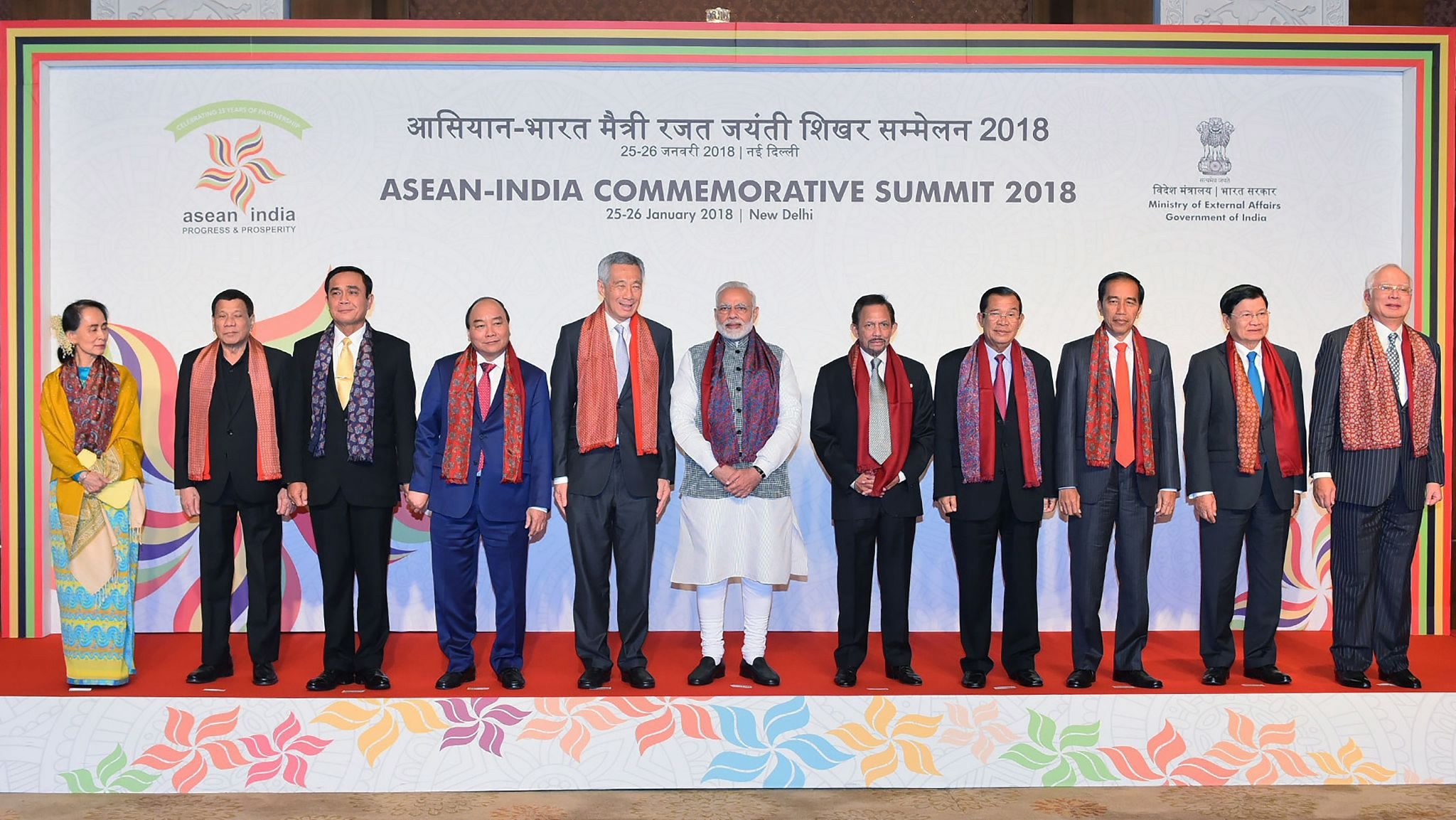
India and ASEAN agreed to enhance maritime and economic cooperation as they marked 25 years of ties with a commemorative summit in New Delhi on Thursday, before leaders attended the 69th Republic Day parade on Friday.
The “Delhi Declaration” agreed by India and the 10-nation ASEAN (Association of Southeast Asian Nations) bloc placed security, trade, investment and connectivity high on the agenda, with Indian Prime Minister Narendra Modi eager to present his country as a strong partner.
Modi's charm offensive
India has gone all out to charm and impress the ASEAN leaders, a signal of New Delhi’s determination to develop its “Act East” policy and strengthen relations with the bloc amid low trade and tourism volumes.
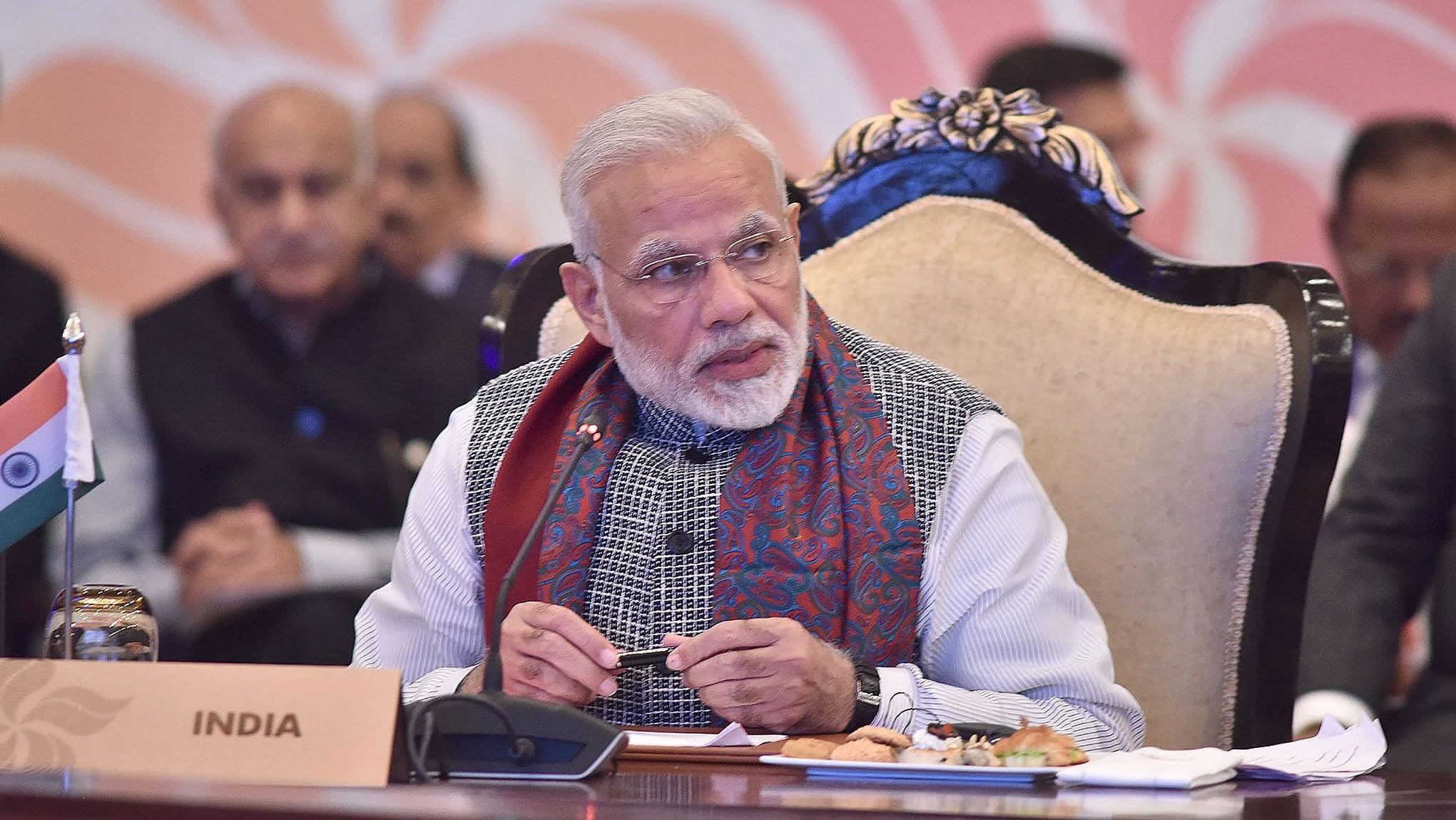
Indian Prime Minister Narendra Modi (C) speaks during the ASEAN-India Commemorative Summit in New Delhi on January 25, 2018. /VCG Photo
Indian Prime Minister Narendra Modi (C) speaks during the ASEAN-India Commemorative Summit in New Delhi on January 25, 2018. /VCG Photo
Leaders from all 10 ASEAN members attended the 69th Republic Day celebrations on Friday as “chief guests,” a gesture described by Modi as “historic and unprecedented.”
Modi also held bilateral meetings with six of the leaders, and one person from each of the ASEAN countries received the Padma Shri award, the fourth-highest Indian civilian honor.
Eyes on RCEP as trade lags
The ASEAN-India Free Trade Area has boosted trade in goods from 2.9 billion US dollars in 1993 to 58.4 billion US dollars in 2016, according to the ASEAN Secretariat, but that pales in comparison to the 368 billion US dollars in China-ASEAN trade volume.
Read more: China and India ties to ASEAN
India accounted for just 2.6 percent of ASEAN’s external trade in 2016, and progress on the Regional Comprehensive Economic Partnership (RCEP) could be central to boosting ties and achieving New Delhi’s target of 200 billion US dollars in bilateral trade with ASEAN countries by 2022.
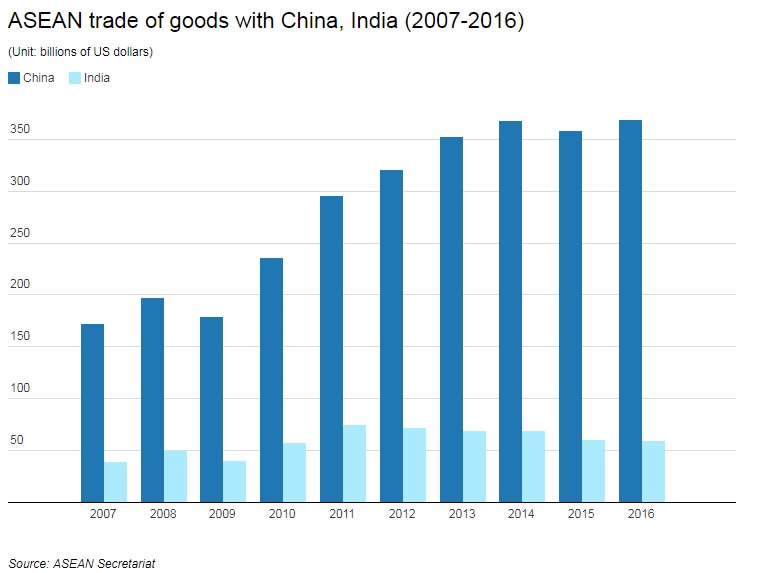
CGTN Graphic
CGTN Graphic
Pressure is growing on India to agree to the terms of RCEP, the regional trade pact being negotiated by India and the ASEAN 10 plus China, South Korea, Japan, Australia and New Zealand.
The Delhi Declaration included a commitment to “intensify efforts in 2018 toward the swift conclusion” of RCEP.
Singaporean Prime Minister Lee Hsien Loong, the current chair of ASEAN, expressed hope that a conclusion could be reached this year.
"Stream-lining rules and regulations will stimulate investments in both directions, complement India's 'Act East' policy and facilitate 'Made in India' exports to the region," Lee said on Thursday.
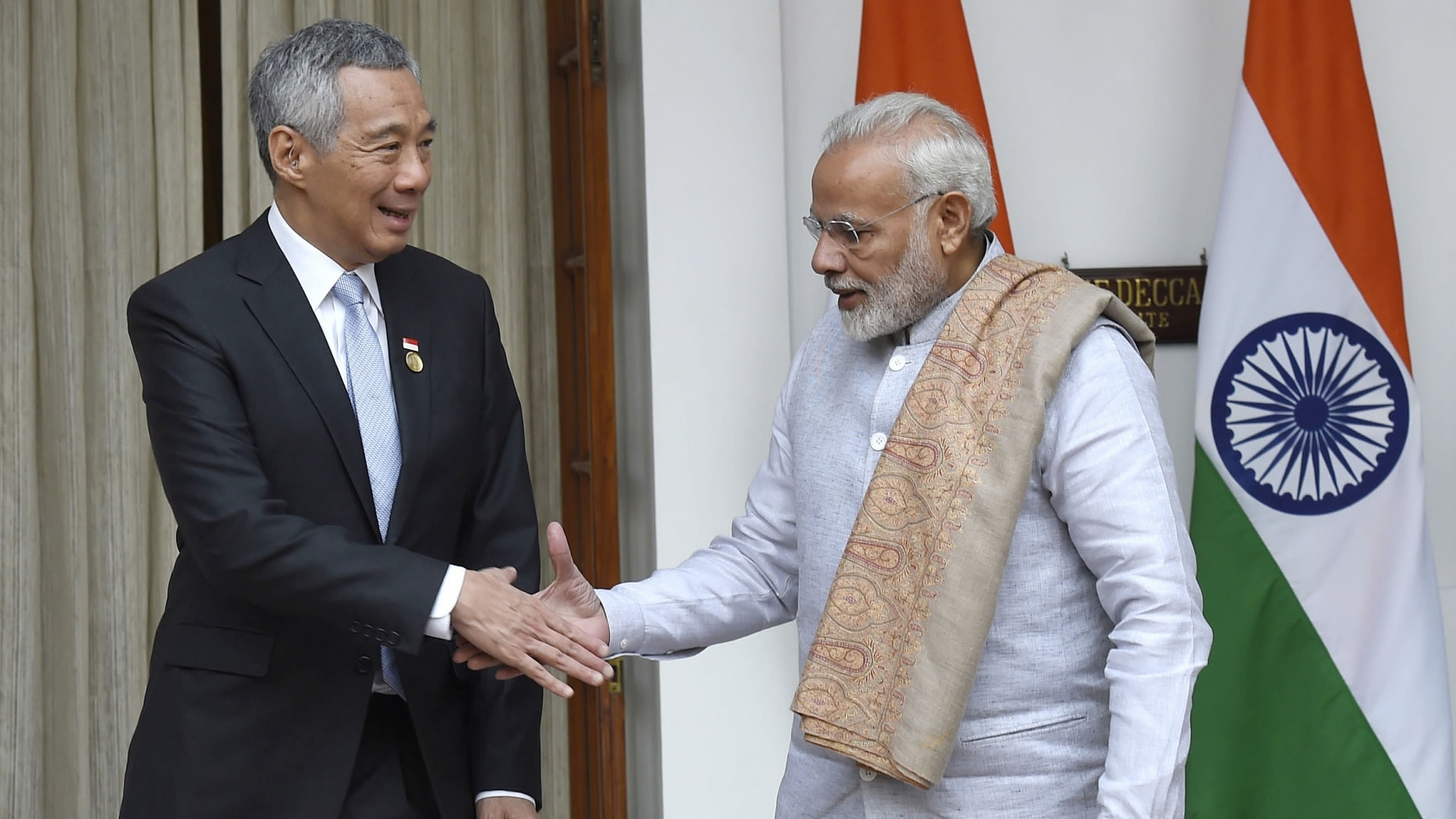
Indian Prime Minister Narendra Modi (R) with Prime Minister of Singapore Lee Hsien Loong (L) prior to a bilateral meeting on January 25, 2018 in New Delhi, India. /VCG Photo
Indian Prime Minister Narendra Modi (R) with Prime Minister of Singapore Lee Hsien Loong (L) prior to a bilateral meeting on January 25, 2018 in New Delhi, India. /VCG Photo
RCEP, if established, would be the largest free-trade bloc in the world, covering 3.5 billion people and 30 percent of global GDP. The next round of formal discussions on RCEP is due to take place in Indonesia in February.
Maritime cooperation
Talks took place on maritime cooperation and security, areas in which India expressed willingness to strengthen ties with ASEAN nations.
The country already holds maritime exercises and patrols with several ASEAN members.
"The leaders did agree to establish a mechanism for greater cooperation in the maritime domain sector," an Indian official said after the gathering.
Disaster relief efforts and freedom of navigation were also discussed, and the end-of-summit statement called for progress on talks over the Code of Conduct in the South China Sea.
Anti-terror commitment
The Delhi Declaration featured a call for a joint approach to counter “cross border” terror and stressed that there can be “no justification for acts of terror on any grounds whatsoever.”
It included a commitment to “deepen cooperation in combating terrorism in all its forms and manifestations, violent extremism and radicalization.”
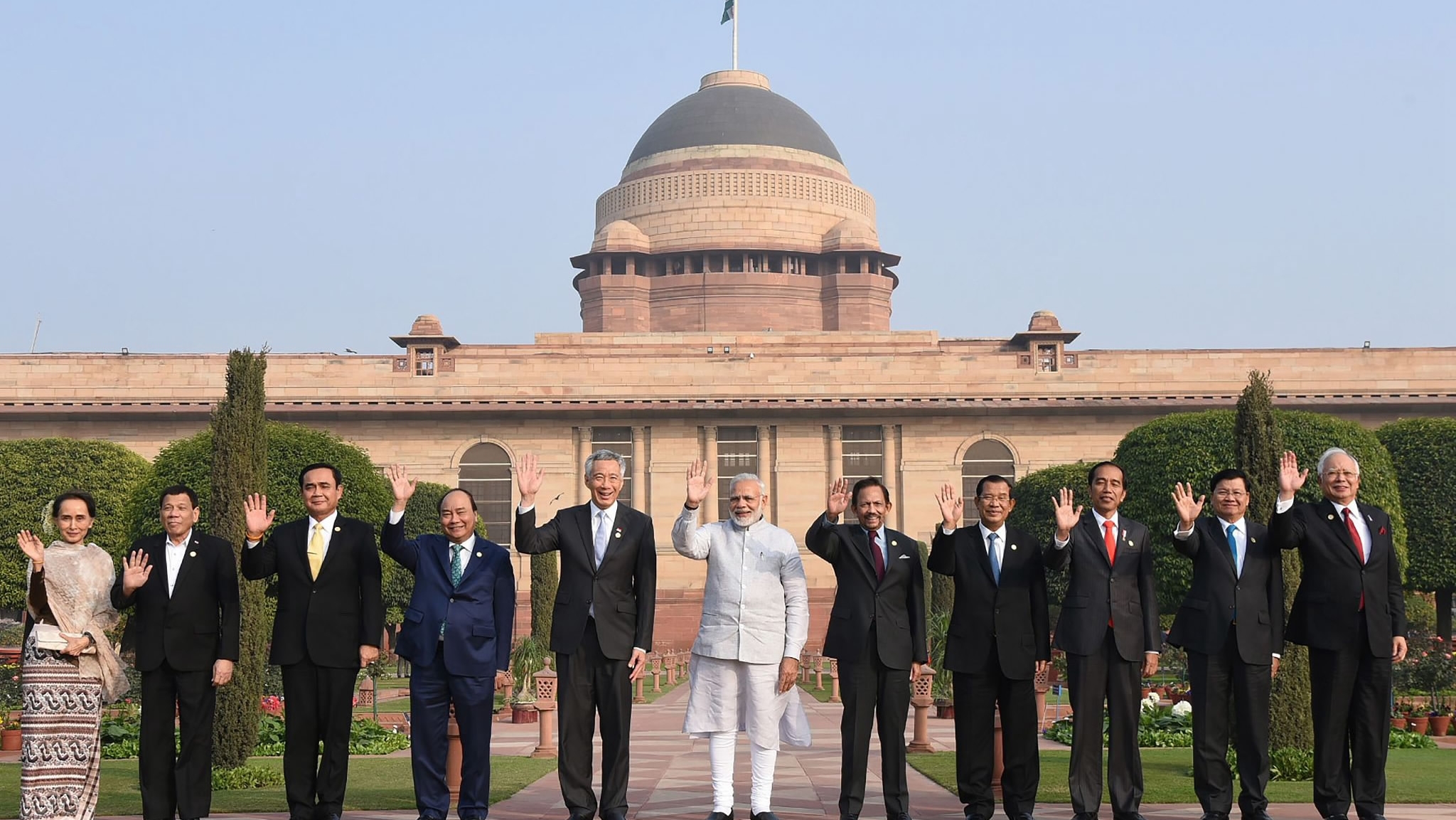
Indian Prime Minister Narendra Modi (C) poses for a photograph with ASEAN heads of state at Rashtrapati Bhavan in New Delhi on January 25, 2018. /VCG Photo
Indian Prime Minister Narendra Modi (C) poses for a photograph with ASEAN heads of state at Rashtrapati Bhavan in New Delhi on January 25, 2018. /VCG Photo
The parties also agreed to cooperate to curtail terror financing and recruitment, and working together on cyber-security strategy.
Connectivity progress limited
Sushma Swaraj, India’s external affairs minister, has promoted a 3-C (Commerce, Connectivity, Culture) plan to strengthen engagement with ASEAN nations.
The Delhi Declaration included a commitment to enhance connectivity, but infrastructure projects have so far been limited.
India has, however, provided a one-billion-US-dollar line of credit to help develop physical and digital connectivity. An India-Myanmar-Thailand highway from Moreh in northeastern India to Mae Sot in Thailand is under construction, and the project could be extended to Cambodia, Laos and Vietnam.
Singaporean Prime Minister Lee identified connecting e-payment systems and the ASEAN-India Air Transport Agreement as areas for potential tie-ups.
3786km

SITEMAP
Copyright © 2018 CGTN. Beijing ICP prepared NO.16065310-3
Copyright © 2018 CGTN. Beijing ICP prepared NO.16065310-3